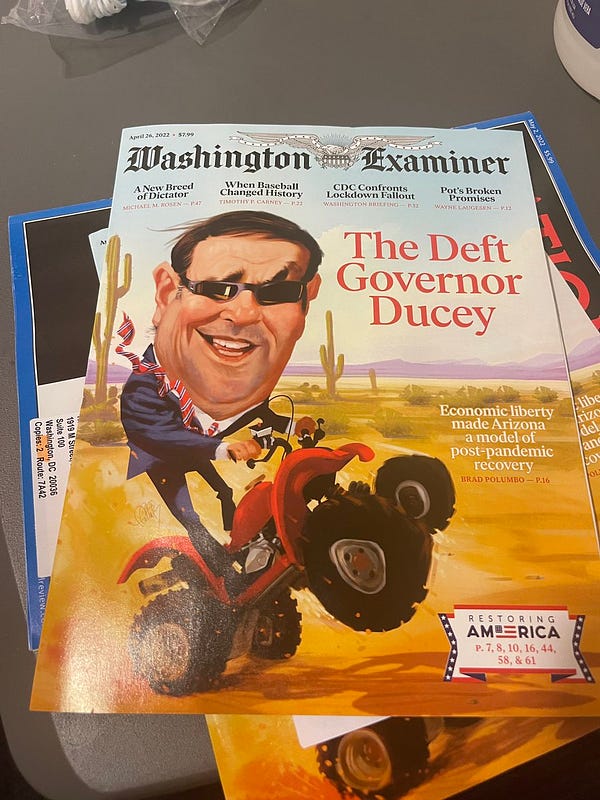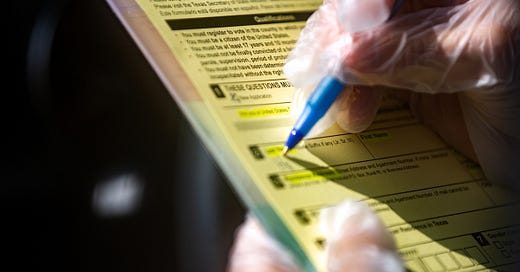The Daily Agenda: But it grows on trees, right?
Fines are fine ... Debates are debatable ... And COVID-19 is pleased to meet you.
The world is facing a global paper shortage right now – and it’s about to become a political problem.
Major printing operations are turning down jobs because they can’t get supply1. Projects that would have taken days to print are taking months. Prices are climbing quickly. The shortage is affecting nearly every sector of business, and it got worse with COVID-19 supply chain issues.
And you know what requires a lot of paper? An election.

Despite the garbage you may read on the internet, Arizona doesn’t have “voting machines.” Every vote is cast on a paper ballot, which is run through an electronic tabulator to count the votes. Most of those ballots are sent to voters in a paper envelope with paper instructions, then mailed back in a separate paper envelope. And those “I Voted” stickers are paper, too.
To be sure, Arizona elections officials are aware of the problem and have been preparing for a worst-case scenario. There shouldn’t be any shortage of ballots, they say. But they’re being extra careful this year to not make any typos that would require them to reprint ballots or other election material.
Cochise County Recorder David Stevens noted he’s not in charge of procuring actual ballots — that falls to the county elections director — but he’s been stockpiling old envelopes and stickers, which do fall under his purview, just in case. (Luckily, lawmakers didn’t change the mail-in ballot envelopes yet, he said, noting they had considered a bill to require new information on envelopes, like a person’s driver's license number or voter ID number.)
“We ordered enough envelopes over a year ago to cover this election,” he said. “So, yeah, we saw it coming.”
But considering well over 100 million Americans will vote in this November’s election, not to mention sample ballots and the primary elections, this fall will put a huge strain on the paper industry nationwide. Texas already ran out of paper for voter registration forms and had to ration them.


If you’re a voter in Arizona, your ballot almost certainly comes through an Arizona-based company called Runbeck Election Services, whose CEO, Jeff Ellington, attended a roundtable discussion about the ballot paper supply shortage in the U.S. House Administration Committee last month.
Because paper companies are rationing their customers to the same allocation that they used in 2020, Ellington has had to turn down new customers. But with a little scrambling and some creative sourcing, he’s already secured pledges from vendors to provide about 95% of the paper he’ll need to fuel Arizona’s voters.
Still, he’s hesitant to declare there’s no risk, noting that he doesn’t actually have the paper yet. If COVID-19 makes a comeback, or shipping and logistics get strained, or something happens to the paper mills, the problem could get worse.
And if, like us, you’re thinking, maybe there’s something to the idea of bamboo ballots, Ellington is way ahead of you.
“When that whole thing first started I was like, that’s a freaking brilliant idea because bamboo grows so fast. I actually did a little bit of research,” he said.
Unfortunately, he found that bamboo fiber doesn’t hold up well enough to make ballot paper.
Unlike the newspapers piling up in driveways, we’re not contributing to the paper shortage. Subscribe to the Arizona Agenda for just $80 per year so we can buy supplies like paper.
Another toothless law about lawmakers: Democratic Arizona Rep. César Chávez racked up $62,000 in fines for filing his campaign finance reports late over the past five years, but only paid a $1,000 slap on the wrist for the noncompliance, the Republic’s Ray Stern reports. He has even more fines outside the settlement, though, so he could end up paying more. But former Democratic candidate Ted Prezelski of Tucson has Chávez beat: He owes nearly a million dollars in late fees, all from old campaign accounts that he never closed.
It is, indeed, all bullshit: As part of its ongoing collaboration with Frontline, ProPublica published another longform piece tracing “the story of how little untruths added up to the ‘big lie.’” Arizona, of course, plays prominently in the piece, which unearthed new emails and details about how former President Donald Trump and his team ignored all evidence contrary to their assertion that the election had been stolen. Trump’s team even debunked the South Korean airplane full of ballots conspiracy that reformed Stop the Stealer Staci Burk got conned into promoting and declared internally that “it’s all bullshit” while continuing to promote it externally.
Anywhere, USA, is a border town: Secretary of State Katie Hobbs might have embraced Title 42 (despite it “not working”) but one of her biggest supporters, Tucson Mayor Regina Romero, wants to repeal it, she said in a statement with fellow “border mayor”2 Trey Mendez of Brownsville, Texas, The Hill reported.
He resigned in 2020 over “health concerns”: Felipe Fuentes, the former Santa Cruz County assessor, allegedly accepted bribes to help a big developer in the county, and he pled guilty to one charge of conspiracy to commit wire fraud, the Nogales International’s Angela Gervasi reports. Court documents don’t name the developer who paid the bribes, but Gervasi used the context clues in filings to figure out it’s likely Dino Panousopoulos, who hasn’t been charged so far.


Make Measles Great Again: The increase in anti-vax behavior isn’t just about COVID-19 vaccines. Measles vaccination rates for Maricopa County kindergarteners have fallen and are now about 90%, state data shows, below the herd immunity level of the highly contagious disease, 12News’ Brahm Resnik reports.
Debate me, coward: GOP U.S. Senate candidate Blake Masters is trying to goad his competitor, Arizona Attorney General Mark Brnovich, into a debate this weekend where he also teases that a “special guest” could make a virtual appearance as the crowded GOP field waits to see who former President Donald Trump will endorse, the Republic’s Yvonne Wingett Sanchez reports.
If a $50,000 daily fine doesn’t convince him, we don’t know what will: Disbanding the company won’t help Cyber Ninjas CEO Doug Logan and his wife from evading public records laws, a judge in the ongoing records battle said yesterday.
“He needs to turn over everything. Every email. Every text. Everything,” Maricopa County Superior Court Judge Michael Kemp said. “The issue of public records has been clearly resolved. These are public records. There is no more dispute over that. That is the law of the case. Period.”
We’ll sign up for Camp Nowhere: Registration for summer camps through Ducey’s summer camp directory designed to help kids catch up on learning are now open to families.

They don’t say that word around here: Despite extreme temperatures and a megadrought, the Arizona Legislature hasn’t done anything this session about climate change, leaving cities around the state to come up with plans for combatting it with their hands tied by state laws that preempt some of their options, Emily Delaney writes for the Arizona Mirror.
One of many problems: University of Arizona Global Campus students can again use VA and GI Bill benefits to pay their school bills after the former Ashford University got back its ability to accept the funds now that the headquarters is in Arizona instead of California, the Republic’s Alison Steinbach reports.
The wild west of water: A fifth-generation farm in the Casa Grande area usually grows alfalfa and cotton, both water-intensive, but drought conditions and water cutbacks mean the Caywood family is growing different crops and still faces a high tax bill even if they get little to no water, KTAR reports in an ongoing water series.
The student-teacher pipeline: The percentage of Latino teachers doesn’t come anywhere near the percentage of Latino students in Arizona schools, which advocacy groups suggest could be one factor in lower reading and math proficiency for Latino students, Cronkite News reports.


City worker shortages abound: The Gila County Sheriff’s Office says it is severely understaffed on detention officers for the Payson Jail, requiring them to cut hours or close down and send people to Globe instead because the pay for detention officers is on par now with fast-food jobs, the Payson Roundup’s Michele Nelson reports.
Was this literally written by a virus?: Today’s weird read, written from the perspective of COVID-19 itself.
Gov. Doug Ducey signed a Goldwater Institute-backed bill yesterday dubbed “Right to Try 2.0” that allows patients with life-threatening or severely debilitating illnesses to access individualized treatments that aren’t yet approved by the Food and Drug Administration.
Right to Try 1.0, which allows terminally ill patients to access treatments that aren’t FDA-approved, became federal law during the Trump administration after Goldwater got laws passed at the state level in most states.
Senate Bill 1163, sponsored by Sen. Nancy Barto, received some bipartisan support in the House and Senate.
Arizona is the first state to approve the 2.0 version, though, based on Goldwater’s lobbying on Right to Try 1.0, it likely will spread to other states.
Rachel really wants a section of the newsletter, maybe in the slow season, that’s basically “this feels weird to me, but I can’t say exactly why,” and we would put things in it like this:
Insurance company State Farm sponsors an “Incident Response Unit” of the Arizona Department of Transportation, where trucks bearing the State Farm logo respond to crashes and traffic control issues.
Government, brought to you by private business.
The paper problem didn’t start with COVID-19. For decades, U.S. paper production has been on the decline. As the world went digital, paper demand flagged and paper mills shut down. Producers switched over to making cardboard boxes, diapers and other products more profitable than sheets of paper. Warehouses shuttered and the buffer supply dwindled. Prices skyrocketed.
The Hill piece described Tucson as a border town, noting it has a port of entry. The port is at the airport, and by that metric, Scottsdale is a border city, too. And FWIW, it doesn’t appear Tucson International Airport has any international flights to Mexico anymore, only to Canada.







I would love a "this feels weird to me, but I can’t say exactly why" section